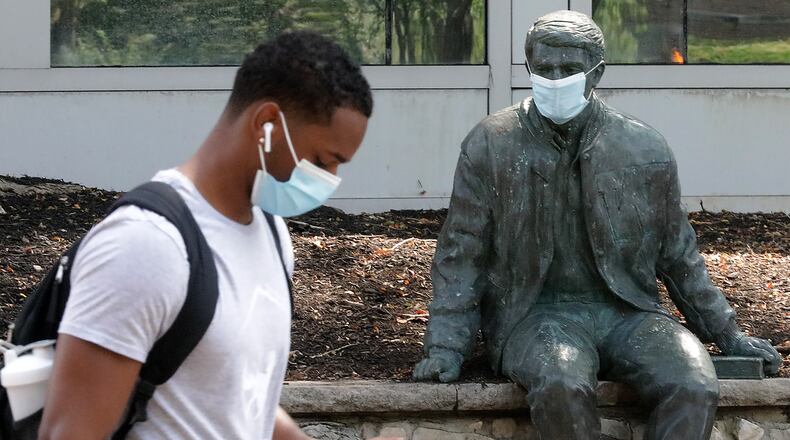That number is a stark contrast to other universities across the country and in the region that are struggling to slow the spread of the coronavirus on campus. One of those universities is the University of Dayton — which reported 111 new cases of the virus on Monday alone, bringing the campus’s total to 744.
Wright State University had reported no cases of COVID-19 as of Friday. However 70% of classes at WSU are online and a large number of students are commuters, a university spokesman said last week.
Gary Williams, vice president and director of athletics and recreation, as well as the co-chair of Wittenberg’s COVID-19 response team, said the university formed their COVID policies based on guidance from the Centers for Disease Control and Prevention, the Ohio Department of Health and the Clark County Combined Health District.
“But I don’t think there is one magical thing that we are doing differently than other universities,” Williams said. “I think the most important thing is, and I’m not sure every other campus and university is the same, but we listened to our people and our staff and our students about what they wanted to do and what they felt safe doing.”
At the top of that list of suggestions were things like mandatory mask-wearing on campus and in the classroom and up-to-date communication between the administration and students. Williams said the university implemented those suggestions before anyone set foot on campus on Aug. 17.
Another suggestion was on-campus testing, which the university does conduct with the help of a partnership with Mercy Health. However, as of Monday, tests are only available to those who are symptomatic and have a doctor’s referral.
Williams said he understands that might make Wittenberg’s case numbers “look better on paper.”
“We aren’t naive about that. But all of our students have been amazing as far as coming forward with symptoms. That’s the real positive we weren’t expecting is that we are seeing a lot of students that are self-identifying and reporting symptoms to us,” Williams said.
Because students are being more open about potentially displaying symptoms of the virus, Williams said, the university has been able to be “extremely aggressive,” with quarantining students who may be potentially carrying the virus. In addition to quarantining students quickly, Williams said the university has also partnered with the CCCHD’s contact tracing team in order to train their own tracers.
With their own tracers, Williams said the university can “expedite” the contact tracing process.
“College campuses - and every situation is a little different- but the stakes for us are higher. If a person in the community tests positive they don’t have as many interactions. They may have work, or the grocery store, and their family. These students have a lot of interactions in a day. There are roommates and fraternities and sororities and teammates that they are interacting with on a daily basis. So contact tracing can take a lot longer,” Williams.
Through working with students in the contact tracing process, Williams said the university discovered students were incredibly open with tracers, which made it easier for them to follow the virus from person-to-person.
Williams said the university also realized how “serious” students were about COVID when they launched an online tip-line and email address where students can submit questions and report those violating rules against large gatherings.
“We follow up on all those tips and every single email probably within an hour. One of us will respond to any and all COVID-issues that come in,” Williams said. “We hear a lot about the bad things, but there are good things happening. These students are more aware of their role in the community and in this pandemic.”
But despite all of the protocols put in place, Williams said he understands that university students and staff, “aren’t perfect.”
“We are prepared for it to get more difficult and we just continue to take every day as a gift,” Williams said. “But giving students the opportunity to have a college experience during a pandemic is something. I hope when we look back on this, we will be proud of how this was handled.”
ODH offering free pop-up COVID-19 testing in Springfield today
The Ohio Department of Health will hold free pop-up COVID-19 testing tomorrow in Springfield, according to a statement from ODH.
Testing will take place Tuesday, Sept. 1, from 5 to 7 p.m. at Rocking Horse Community Health Center, 651 S. Limestone St. in Springfield.
“Anyone can get a no-cost test at this location. No appointment is needed; anyone can walk-in. A health care provider’s referral is not needed. Quantities may be limited,” the statement said.
About the Author

